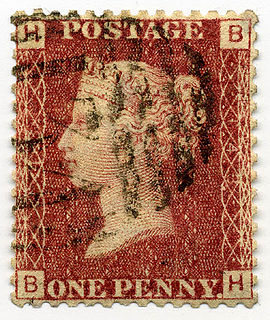Related Research Articles

Philately is the study of postage stamps and postal history. It also refers to the collection, appreciation and research activities on stamps and other philatelic products. Philately involves more than just stamp collecting or the study of postage; it is possible to be a philatelist without owning any stamps. For instance, the stamps being studied may be very rare or reside only in museums.

Stamp collecting is the collecting of postage stamps and related objects. It is related to philately, which is the study of stamps. It has been one of the world's most popular hobbies since the late nineteenth century with the rapid growth of the postal service, as a never-ending stream of new stamps was produced by countries that sought to advertise their distinctiveness through their stamps.

The postage stamps and postal system of the Confederate States of America carried the mail of the Confederacy for a brief period in American history. Early in 1861 when South Carolina no longer considered itself part of the Union and demanded that the U.S. Army abandon Fort Sumter, plans for a Confederate postal system were already underway. Indeed, the Confederate Post office was established on February 21, 1861; and it was not until April 12 that the American Civil War officially began, when the Confederate Army fired upon US soldiers who had refused to abandon the fort. However, the United States Post Office Department continued to handle the mail of the seceded states as usual during the first weeks of the war. It was not until June 1 that the Confederate Post office took over collection and delivery, now faced with the task of providing postage stamps and mail services for its citizens.

Edward Benjamin Evans, a British army officer also known as "Major Evans", was a distinguished philatelist, stamp collector, and philatelic journalist. His philatelic specialization included Mauritius, the Confederate States of America, the Mulready envelopes, and the Indian feudatory states.
First Issues Collectors Club, or FICC, is an international society for collectors of the first postage stamps issued by any legitimate postal administration.
Harrison Donald Seaman Haverbeck or H.D.S. Haverbeck, FRPSL, RDP, was a noted philatelist and philatelic journalist, whose interests centered on India and Indian states, Tibet and Nepal.

The postage stamps and postal history of Israel is a survey of the postage stamps issued by the state of Israel, and its postal history, since independence was proclaimed on May 14, 1948. The first postage stamps were issued two days later on May 16, 1948. Pre-1948 postal history is discussed in postage stamps and postal history of Palestine.

Lawrence Lewis "Larry" Shenfield was an advertising executive who was instrumental in promoting the development of radio broadcasting during its golden age of the 1920s and 1930s. Larry lined up sponsors to help further the popularity of such stars as Orson Welles and Dinah Shore. After his retirement, Larry developed a second career as a prominent philatelist internationally recognized in the field of postal history. His careful studies of the postage stamps and postal history of the Confederate States are relied upon by stamp collectors and experts in philately to the present day.
August Dietz was a philatelist, editor and publisher, who specialized in the study of mail and postal history of the Confederate States of America.
The Philatelic Foundation is a philatelic organization granted a charter in 1945 by the University of the State of New York as a Nonprofit Educational Institution.
James Richard William Purves – generally denoted in publications as J. R. W. Purves -- was an Australian lawyer and philatelist. His half century of work in Australian philately earned him the title "The personification of Australia in International Philately".
Stanley Bryan Ashbrook, of Kentucky, was a distinguished American philatelist who was known for his extensive studies of early United States stamps and postal history. He was usually known as Stanley B. Ashbrook.
John Robert Boker Jr. was an American philatelist who amassed some of the most prestigious collections of 19th century stamps ever seen by stamp collectors. Before his death in 2003, the Collectors Club of New York declared him, in 1996, to be the "outstanding philatelist of the last half of the twentieth century."
Society for Czechoslovak Philately (SCP) is a philatelic organization dedicated to the collection and study of the postage stamps and postal history of Czechoslovakia, the Czech Republic and Slovakia.
Patricia A. (Trish) Kaufmann of Lincoln, Delaware, is an expert on the postage stamps and postal history of the Confederate States of America (CSA), and has written hundreds of articles on the subject; she is known as a diligent researcher who brings postal history to life. She is also a speaker on the subject.
Edward Spring Knapp, of New York City, was a philatelist known for his remarkable collections of postage stamps and postal history.
Francis J. (Frank) Crown, Jr. of Capshaw, Alabama, is a noted collector of postage stamps and postal history of the Confederate States of America. He is a retired United States military officer.
Jerry S. Palazolo of Memphis, Tennessee, is a collector and expert of postage stamps and postal history of the Confederate States of America. He is also owner of a retail wine and liquor business.
Andrew Earl Weatherly, of North Carolina, was a philatelist dedicated to the study of postage stamps and history of the Confederate States of America.

Benjamin Wishnietsky (1915-2013) was a retired textile chemist and a collector of United States, Greek, and Confederate philatelic material for his entire adult life.